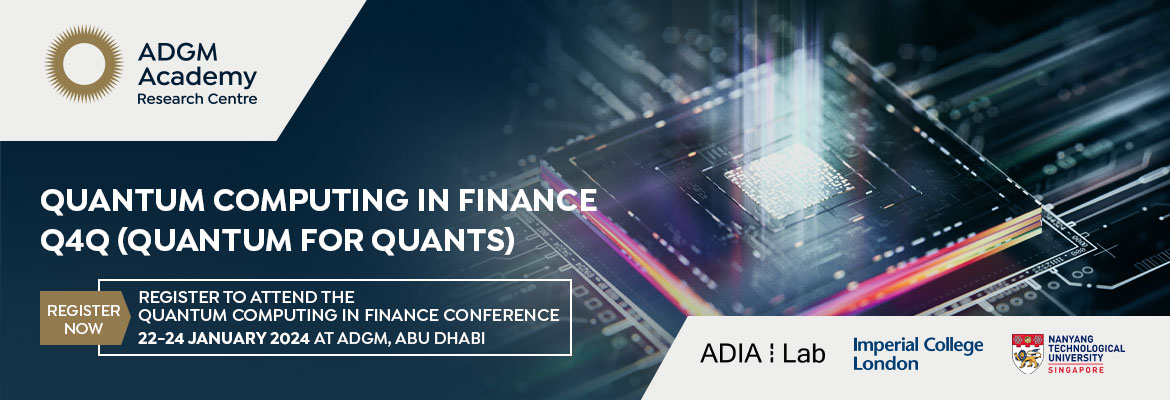
Event Agenda: 24 January 2023 – Day 3
Time
Agenda
08:30 - 09:00
Registration
09:00 - 09:05
Welcome address
Speaker
Rina Bardic, ADIO
09:05 - 09:50
[TBC]
Speaker
Heike Riel, IBM
09:50 - 10:30
Quantum Optimization: Potential and Challenges
Quantum computing could revolutionize numerous areas in business and science, with optimization often named as a prime candidate to profit from such a revolution. This follows from the fact that optimization problems are ubiquitous, and therefore, any improvement over the state-of-the-art classical algorithms with quantum computers could have a huge impact. Moreover, these improvements could occur across multiple dimensions, such as solution quality, solution diversity, time to solution, and cost to solution. But just how tangible are the benefits of quantum optimization? Grover’s Search algorithm and Quantum Adiabatic Annealing provided a promising start, but it has become clear that more tools are needed to demonstrate near-term benefits in optimization problems. We give an overview on the state of affairs, especially looking at NP-hard combinatorial optimization problems, like, e.g., portfolio optimization.
Speaker
Thorsten Koch, Zuse Institute Berlin
10:30 - 11:00
Coffee Break
11:00 - 11:30
[TBC]
Speaker
Casey Myers, Silicon Quantum Computing
11:30 - 12:00
Quantum Key Distribution (QKD)
Speaker
James Grieve, Technology Innovation Institute
12:00 - 12:30
Quantum computing and quantum communications in the financial industry
The talk describes the state of the art of quantum computing for finance, focusing on the research work conducted by the quantum computing team at JPMorgan Chase in the area of quantum algorithms and applications for financial use cases. This presentation will also touch upon JPMorgan Chase’s research effort in the area of Quantum Key Distribution (QKD), the only key-exchange mechanism mathematically proven to be unconditionally secure and, therefore, resistant to quantum or classical computing attacks.
Speaker
Marco Pistoia, JPMorgan
12:30 - 13:30
Lunch
13:30 - 14:00
[TBC]
Speaker
Tobias Haug, Technology Innovation Institute
14:00 - 14:30
Preparing for the Most Complex Upgrade Ever
This talk will discuss how to prepare for the most complex upgrade ever, as the Quantum threat is forcing us to upgrade all cryptography systems globally. We can’t leave anything out, and it takes all of us working together to do so. I will build on previous talks with banks about how to get the CEO’s to take action. The bottom-up approach does not work, so we need to focus on regulators to force banks to act. Will present his view on who, when, how long things could take, and why and what needs to be done in order to prepare for the Y2Q, and did people think about the unix end-of-time which happens in 2038? A lot of resources are needed in the coming years.
Speaker
Dimitri van Esch, Quantum Gateway Foundation
14:30 - 15:00
Quantum-enhanced stochastic modelling and its potential implications for finance
Stochastic modelling and simulation are critical components of time-series analysis. They provide systematic means for us to make inferences about future occurrences and their potential likelihoods based on data available in the present and simultaneously help us isolate what elements of the past are most pertinent for predicting future behaviour. Yet, as the process we wish to model becomes ever more non-Markovian, and the futures we want to infer are ever more rare, the memory and time resources needed by traditional techniques can grow in tandem. In this presentation, I outline the potential for quantum models to mitigate such resource requirements. I will introduce quantum stochastic models, illustrating their potential to (i) generate equally accurate future predictions while tracking less data from the past and (ii) generate such predictions in quantum superposition. I then outline how these ideas can be combined for enhanced quantum stochastic analysis - allowing potential for quadratic speed-up in estimating the likelihood of rare events and quantum-enhanced dimensional reduction with reduced model distortion.
Speaker
Mile Gu, Nanyang Technological University
